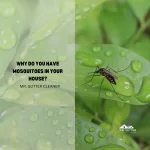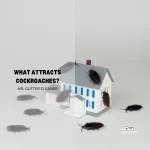In homes, flies are attracted to specific conditions and materials, with dirty gutters and drains presenting ideal breeding grounds due to the combination of moisture and organic waste.
Understanding these attractors is crucial for homeowners, enabling them to effectively prevent infestations.
Regular maintenance routines, such as cleaning gutters and ensuring drains remain free of debris, play a pivotal role in this prevention effort.
By adopting such practices, homeowners not only reduce the likelihood of fly attraction but also contribute to overall home hygiene, thereby mitigating potential health risks associated with fly infestations.
This summary highlights the importance of proactive home maintenance measures in managing and comprehending the factors that attract flies.
By aligning with the search intent to inform homeowners, it serves as a valuable resource for those seeking to safeguard their homes against fly infestations.
Ultimately, through informed action and consistent upkeep, homeowners can effectively combat fly infestations and uphold the well-being of their households.
Understanding Flies and Home Maintenance
Flies are attracted to homes mainly because of food waste, moisture, and the availability of breeding grounds, with dirty gutters and drains being prime examples. These areas accumulate organic materials and standing water, creating an ideal environment for flies to feed, breed, and thrive. Regular cleaning and maintenance of gutters and drains are essential strategies for homeowners to prevent fly attraction. This proactive approach not only minimizes the potential for infestation but also contributes to the overall hygiene and wellness of the home environment, aligning with the broader goal of informed and effective home maintenance.
Why Are Flies Attracted to Homes?
Flies are attracted to homes primarily for food, moisture, and breeding sites. Kitchens, with food residues, and bathrooms, often damp and humid, are particularly appealing. Dirty gutters and drains enhance this attraction by providing flies with the necessary conditions for breeding, including moisture and decaying organic material. Addressing these issues through regular home maintenance can significantly reduce the presence of flies, emphasizing the importance of cleanliness and proper waste management in deterring these pests.
How Do Dirty Gutters and Drains Appeal to Flies?
Dirty gutters and drains appeal to flies by offering abundant food sources and breeding grounds. These areas trap leaves, twigs, and other debris, which decompose over time, creating an ideal environment for flies. The stagnant water in blocked gutters and drains further attracts flies, providing them with the moisture they need for breeding. Regularly cleaning these areas removes the attractions, disrupting the life cycle of flies and preventing them from proliferating around the home.
The Role of Home Maintenance in Fly Prevention
Regular maintenance of home environments, specifically gutters and drains, plays a pivotal role in deterring fly infestations. Clean gutters and well-maintained drains eliminate the conditions flies seek for breeding and feeding, directly impacting the likelihood of their presence in and around a home.
Regular Gutter Cleaning: Why Is It Crucial?
Regular gutter cleaning removes leaves, twigs, and other debris that can trap water and organic material, preventing the accumulation of elements that attract flies. This proactive approach is essential for maintaining a fly-free environment by disrupting their breeding cycle.
The Impact of Drains on Fly Attraction
Properly maintained drains are less likely to offer the stagnant water and organic decay that flies find appealing. Ensuring drains are clear of obstructions and residues significantly reduces the factors that can lead to fly infestations, highlighting the importance of routine drain maintenance in comprehensive home care strategies.
Practical Steps for Homeowners
To effectively deter flies, homeowners can adopt several practical measures focusing on gutter and drain maintenance. These steps not only address the immediate problem of fly attraction but also contribute to the overall upkeep of the home.
How Can You Keep Gutters Clean to Deter Flies?
Maintaining clean gutters is crucial in preventing flies from being attracted to your home. Regularly removing debris, such as leaves and twigs, ensures that gutters do not hold standing water or organic matter, both of which are attractive to flies.
Installing gutter guards can also reduce the need for frequent cleanings.
Best Practices for Drain Maintenance and Fly Prevention
Ensuring drains are free from organic blockages and standing water is equally important. Regularly cleaning drains with a mixture of vinegar and hot water can prevent the accumulation of materials that flies are drawn to.
Additionally, checking for and repairing any leaks can eliminate moisture sources that attract flies.
Beyond Cleaning: Long-Term Solutions
Addressing fly attractions in homes extends beyond routine cleaning to include long-term solutions that permanently reduce their presence. These solutions focus on structural and environmental modifications to deter flies effectively.
What Are Permanent Fixes for Fly Problems?
Permanent solutions involve modifying the home environment to make it less attractive to flies. This can include installing fine mesh screens on windows and doors to prevent flies from entering, using UV light traps that attract and kill flies, and ensuring all waste bins are tightly sealed. Landscaping changes that reduce standing water can also deter flies by removing breeding sites.
Innovations in Home Maintenance to Combat Fly Attraction
Advancements in home maintenance technology offer new ways to combat fly attraction. For example, smart gutter systems can automatically clear debris, reducing the need for manual cleaning.
Similarly, eco-friendly drain cleaners utilize enzymes to break down organic matter without harming the environment, preventing the conditions that attract flies. These innovations provide homeowners with effective tools to maintain a fly-free home.
Understanding the Bigger Picture
Effective home maintenance not only prevents fly infestations but also has broader environmental implications. Adopting eco-friendly practices in routine maintenance activities can significantly impact local ecosystems by reducing pollution and promoting biodiversity.
How Does Home Maintenance Impact Local Ecosystems?
Home maintenance practices, when executed with an environmental consciousness, can minimize harmful runoff into local waterways, reduce chemical usage, and foster habitats for beneficial insects and wildlife. By choosing sustainable materials and methods, homeowners contribute to the health of their surrounding ecosystems.
The Importance of Eco-Friendly Practices in Fly Prevention
Incorporating eco-friendly practices into fly prevention strategies, such as using natural repellents and ensuring proper waste composting, not only addresses fly problems but also supports environmental sustainability. These methods reduce reliance on harmful chemicals, promoting a safer habitat for all living organisms.
Community Efforts and Personal Preventive Measures
Community and individual actions play a crucial role in reducing fly populations. By collectively maintaining cleanliness and adopting fly-preventive habits, communities can significantly lower the attractiveness of their area to flies.
How Community Cleanliness Reduces Fly Populations
Community-wide efforts to keep public spaces clean and properly manage waste can drastically reduce fly attractants. Organizing regular clean-up drives and ensuring public bins are covered and emptied frequently discourage flies from congregating and breeding.
Personal Habits to Prevent Attracting Flies
Individuals can contribute by maintaining yard cleanliness, securing trash bags, and using natural repellents. Composting correctly and avoiding leaving pet food outdoors are also effective strategies. Such personal habits, when adopted widely, support community efforts in maintaining a fly-free environment.


